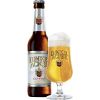Brauerei Dinkelacker - CD-Pils
-
ABV:
5.00% -
Serving Temperature:
48° F -
Suggested Glassware:
Pilsner Glass

Aficionado or novice, you've no doubt encountered the terms Bavaria and Oktoberfest, two words that have made their way onto many a beer label. Bavaria is, of course, the German heartland of beer brewing and drinking, producing more beer per capita than any other region in the world.
The word Oktoberfest has become synonymous with high-quality German beer and brew drinking enthusiasm. The Oktoberfest celebrations began in Munich in 1810 to honor the Bavarian Queen Theresia (wife of King Ludwig). Originally a country fair, Oktoberfest has grown to draw worldwide patronage. The primary rival to the Oktoberfest is the autumn fair of Stuttgart, held in the riverside district of Cannstatt. This event was started in 1818 by the King of Württemberg. Our second featured international beer comes to us from Stuttgart, the capital of Baden-Württemberg, Germany's largest southwestern state. Brauerei Dinkelacker was founded there in 1888 by Carl Dinkelacker, though records dating back as far as the 1500s allude to brewing in the region by the Dinkelacker family. So what's in a name? Dinkel is the German word for spelt, an early form of wheat (often used in beers of southern Germany) and Acker is German for field. So with a name like "Carl Wheatfield", brewing was a destined calling.
Coincident with the industrial revolution that swept the world in the early 1900s, Brauerei Dinkelacker also underwent major technological changes. A consequence of industrialization was a population boom in metropolitan areas. More people meant more workers, which in turn fueled technological advancement, but also required implementation of automation in the brewing process in order to satisfy the demand of the growing populous. Thus, as industrialization begat industrialization in Stuttgart, Dinkelacker added automated brewing and bottling components in 1903. The following sixty years brought tremendous growth for the brewery as they gained international appeal. In 1963, major technological updates were again performed at the brewery. Because of their reputation of constantly being on the forward cusp of brewing technology since their founding, founder Carl Dinkelacker is regarded by many to be the father of the modern day brewery. Their brewery is today considered one of the most modern and environmentally friendly in the world.
If you'd like more information about Brauerei Dinkelacker (and can read German) check out http://www.dinkelacker.de.

Unmatched Variety by style, brewery & country
Choose from Five different Beer Clubs offering unmatched variety by brewery,
country of origin, and beer style to suit your specific tastes.


